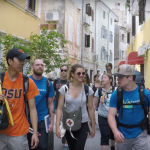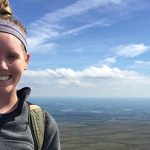
Earning an advanced degree
The Oregon State College of Forestry enjoys a century-long reputation as a leader in forestry research, teaching and extended education. Currently the college has more than 200 graduate students, including 35 international students from all over the world. The college offers graduate degrees in four distinct areas administered by three separate departments. About 75 faculty members teach at the graduate level, and the college employs more than 300 faculty, staff and support personnel.
Graduate degrees offered include Master of Forestry (MF), Master of Science (MS), Master of Natural Resources (MNR) and Doctor of Philosophy (Ph.D.).
FOREST ECOSYSTEMS + SOCIETY – MF, MS, PH.D.
The forest ecosystems and society graduate program develops interdisciplinary thinkers, highly capable scientists and natural resource leaders who are prepared to solve complex problems wherever they exist on the socioecological spectrum.
Students in this program learn to identify and contribute to collaborative solutions in ecology and natural resources-related social science. Students are not limited by mandated curriculum or required study tracks. Instead, faculty and professionals work with students to create their own course lists, program objectives and research projects, allowing students to focus on the skills and knowledge most relevant to their interests.
Students may earn an MF, MS or Ph.D. as they build the skills and knowledge needed for a fascinating career in research, teaching, management policy or outreach.
MASTER OF NATURAL RESOURCES – MNR
The master of natural resources graduate program is an interdisciplinary program designed for natural resources professionals. The 45-credit program is taught entirely online through the nationally-acclaimed OSU Ecampus. The program is offered as a nonthesis option only, similar to the Master of Business Administration (MBA) or MF.
Students in the program develop analytical and problem-solving skills needed to provide workable solutions for complex natural resources challenges and learn how to balance competing economic, health and environmental interests.
Graduates of this program enjoy virtually unlimited career opportunities in natural resources management, ranging from GIS experts and water conflict managers to wildlife habitat specialists and environmental policy analysts.
SUSTAINABLE FOREST MANAGEMENT – MF, MS, PH.D.
The sustainable forest management graduate program emphasizes the conservation of forest-dominated landscapes to meet ecological, economic and social criteria over long time frames through active forest management.
Students in this program may earn an MF, MS or Ph.D., and can specialize in one of six areas of concentration: forest operations planning and management; forest policy analysis and economics; forest biometrics and geomatics; silviculture, fire and forest health; forest soil and watershed processes; or engineering for sustainable forestry.
The sustainable forest management graduate program provide graduates with the foundation for excellent career opportunities throughout industry, higher education, government and nonprofits.
WOOD SCIENCE – MS, PH.D.
The Department of Wood Science and Engineering at the Oregon State College of Forestry offers a graduate education fully engaged in the dynamism and diversity of a rapidly evolving international field. Its wood science graduate program is fundamentally collaborative in nature and offers MS and Ph.D. degrees in a wide range of specialties, from chemistry to business.
Dual graduate degrees are encouraged. Common partner disciplines include civil engineering, mechanical engineering, materials science or forest science.
The demand for energy and thousands of consumer and industrial products made from wood and other renewable materials continues to grow as society becomes more aware of sustainability and green issues. The wood science program provides the foundation for great careers.
GRADUATING OUR FUTURE LEADERS
Educating the future research, teaching and outreach leaders in forest landscapes and ecosystems, the college awarded 102 graduate degrees in FY 2017 and FY 2018.
PARTNERSHIP IDENTIFIES TALENTED GRADUATE STUDENT CANDIDATES
In December 2017, an initiative for recruitment of Native Americans for the college’s graduate forestry programs was developed, funded partially by the department with a supplemental Graduate Laurels Block Grant. A committee including Bureau of Indian Affairs, the Intertribal Timber Council, the USDA Forest Service, and Salish-Kootenai College assisted in identifying potential graduate student candidates. Four Native American students were selected for admission in Fall 2018 and offered these tuition support awards. These students represent 23 percent of the fall 2018 class of forestry graduate program students.
FELLOWSHIPS PROVIDE AFFORDABLE OPPORTUNITIES
• The Dean’s Investment Fund funded two $30,000 matches to the Provost’s Distinguished Doctoral Fellowship, awarded in FY 2017 and FY 2018. The college also awarded more than $200,000 in graduate fellowships in FY 2017 and FY 2018, with a portion of funds coming from the Dean’s Investment Fund.
• With the goal of recruiting and retaining graduate students based on diversity and/or academic merit, the college awarded and administered $140,000 in tuition scholarship funding as part of the Graduate Laurels Block Grant from the OSU Graduate School.
SHARING GROUNDBREAKING RESEARCH
Organized by graduate students, the college hosted the fifth and sixth annual Western Forestry Graduate Research Symposium. The symposium showcases current graduate student research and promotes academic excellence by challenging students to present their work and receive feedback from their academic and professional peers. In 2017 and 2018, the symposium showcased more than 80 combined poster and oral presentations.









